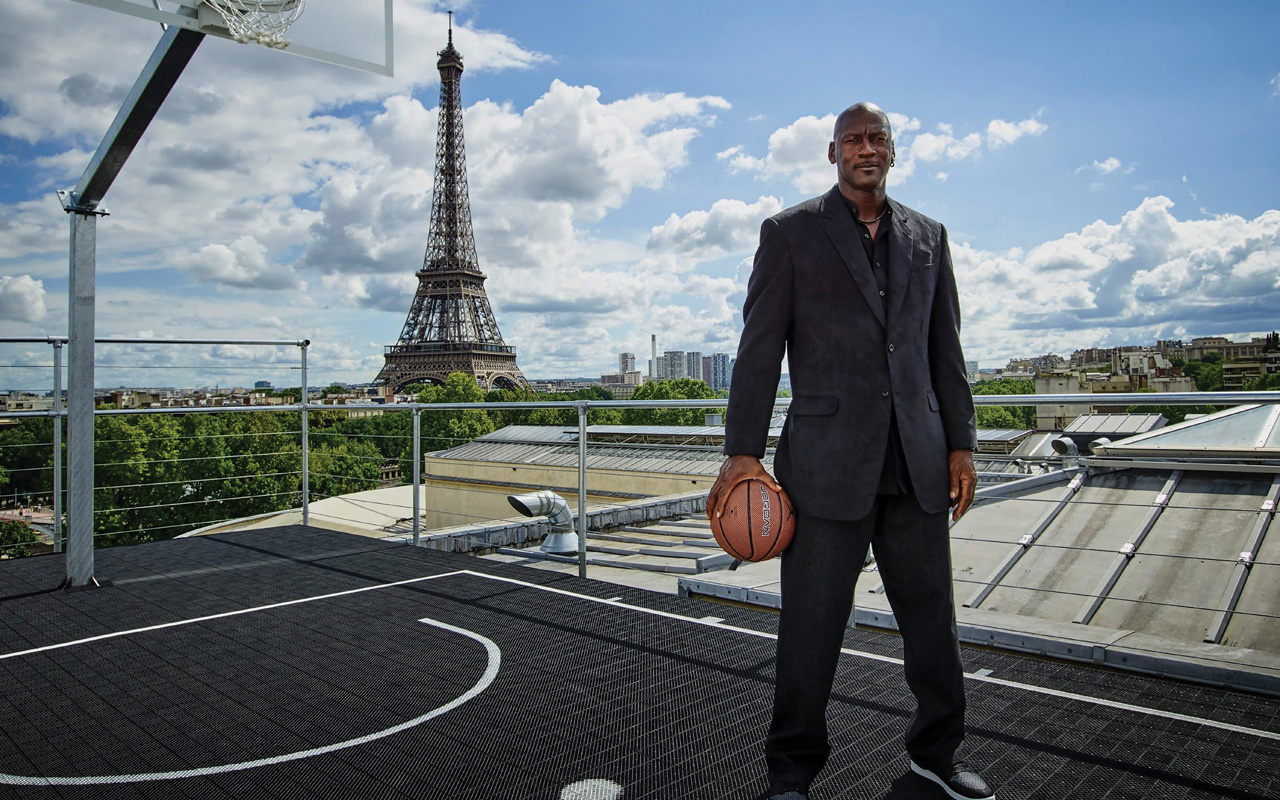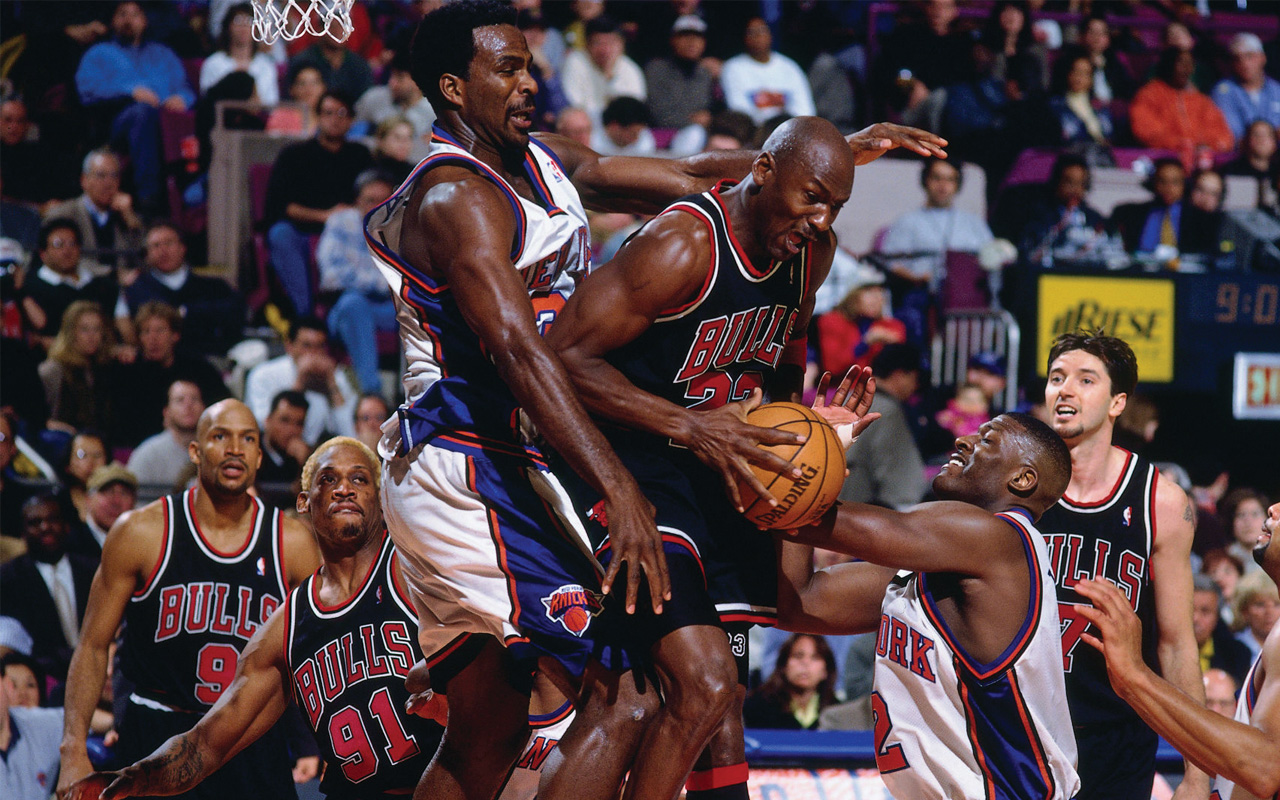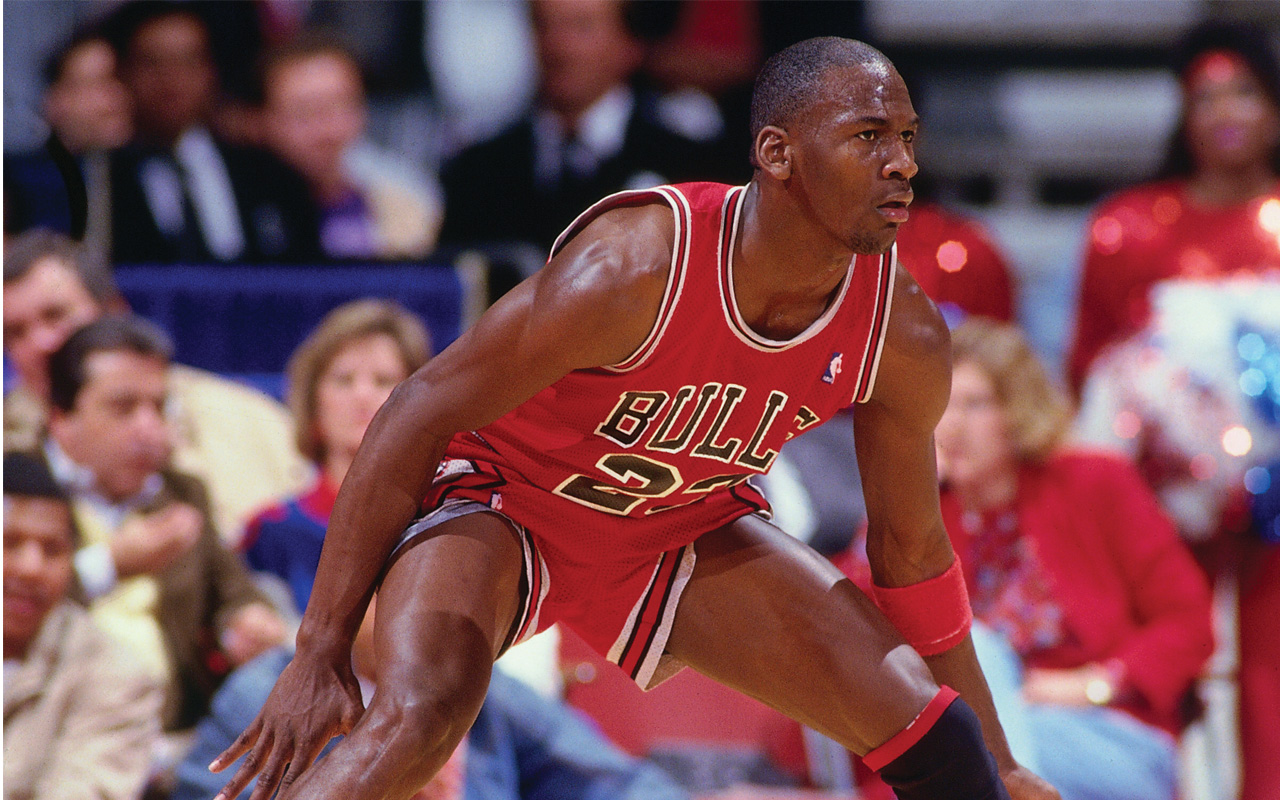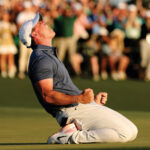
Michael Jordan is widely considered basketball’s greatest player. He accomplished everything possible in the game, piling up on the stats and awards. On the game’s biggest stage—the NBA Finals—he achieved a perfect 6-for-6, also sweeping Finals MVP in his appearances.
James Worthy, University of North Carolina’s Forward between 1979 and 1982, recalls his first days playing with MJ.
“Michael arrived and he was pushing me back on the floor. I was better than he was for about two weeks. Michael wanted to learn and he wanted to grow quickly. He was sucking in all the information, and once he added that to all his raw talent, it was explosive to see.”
Once he had notched up his first wins, Michael’s confidence built – enabling him to take his talent to another stratosphere. He had an ‘on’ switch that was like a rocket blasting off, and opponents didn’t have an answer to that full force ignition.
At the 1984 college draft, the Chicago Bulls picked Michael from UNC – having watched him successfully lead that team. At the following 1984 Los Angeles Olympics, Michael became the most famous and the most popular amateur basketball player in the world. His USA Olympic coach, Bob Knight, described his new team player as the best basketball player he’d ever seen play because he was immensely skilled and highly competitive.
But what also separated Michael from the pack was that he was his own man. As he began his epic journey with the Chicago Bulls, he was exposed to stuff he’d never seen before: drugs and a lifestyle that coined the team a media phrase, ‘The Bulls Traveling Cocaine Circus’. Michael wanted none of it, and was acutely aware of the risks involved, and what the consequences would be if a raid took place. So he went about his daily business as if he were still in college. He played cards, watched movies and relaxed with his friends. Rod Higgins, Bulls Forward from 1982 -1985 referred to Michael as the “orange juice and 7UP guy”.
But many detractors underestimated Michael in 1984. Commentators said that at only 6’6”, he didn’t have the 7-foot capacity to really stand out; that no team is a one-man show. Even Michael admitted that he knew he was the lowest player on the totem poll when he first joined the Chicago Bulls, and that he had to earn his stripes. Within weeks, he proved his detractors wrong.
By the third game, he felt he had earned his stripes for his team. Within two weeks he had gained the reputation as the best player on the team. They were playing the Milwaukee Bucks on October 29, 1984, and the Bulls were losing by 9 points by the end of the third quarter. On Netflix’s ‘Last Dance’ documentary, Michael describes the situation:
“We were losing going into the 4th quarter. The guys were getting down on themselves, and they were chalking this up to a loss – and looking towards the next game. I insisted that the game wasn’t over yet. The ball was being fed to me and I just starting going. We came back and won the game. The team recognized that I wasn’t going to let them lose.”
Isaiah Thomas, 12-time NBA all-star said of this new basketball phenomenon, “Michael had an extra levitation gear. It just didn’t seem real.” Magic Johnson said, “his bounces, his footwork, his fundamentals. They were just incredible.”
Sports Illustrated had him on their cover with the headline ‘A Star is Born.’ Every game that Michael played had sold-out stadiums way before the game. Beyond that, the city of Chicago benefitted enormously. They had a new shining star who attracted people from far and wide to their city. Spectators described him as poetry in motion. He injected life into a dying franchise. Michael played every game like it was his last game on earth.
By 1991, the Bulls were becoming a dream team. Phil Jackson became their head coach, and he devised a new approach and a strategy that worked. The Bulls beat the Lakers in 1991, winning their first NBA championship, and Michael’s emotions were let loose. Frustration and anger turned into elation, and for many, this was a new side to ‘MJ’ that they had not seen before. Magic Johnson said about playing against the Bulls, “If we (the Lakers) were going to lose, then I’d rather lose to Michael. Watching him cry with happiness and busting through – it was beautiful, and that’s how it should be.”

Chicago Bulls vs. New York Knicks – Jordan’s Final MSG Appearance Photo: Alexis Anice Alea/Getty Images
1992 was a particularly special year. ‘Air Jordan’ (nickname for Michael from his Air Jordan sneakers) and the Bulls made it to the NBA Finals – and then Michael was selected for the Olympic Team. By this time, his place in the world was solidified: he was a global cultural phenomenon and revered.
B.J. Armstrong (Bulls guard from 1989 –1995) said,
“Michael knew how to win a game and once he’d figured that out, you couldn’t beat him. He knew how to steer momentum. He was just as good on the offensive end as he was on the defense. He was playing a different game from the rest of the team.”
In the 1992 NBA finals between the Chicago Bulls and the Portland Trail Blazers, Michael’s play was super human – and there was no answer to the level at which he played. The crowd erupted as the Bulls won back-to-back titles and sought to become the third franchise to win three consecutive NBA Championships.
The 1992 Olympic experience in Barcelona was the icing on the cake of that special year. The camaraderie in the team was inviolably strong. Practices were fun and the passes, shooting and defense were exceptional. It truly was a ‘Dream Team’ and Michael was the supreme alpha man on the gold-medal-winning team.
MJ’s competitiveness permeated into everything he did. Forget having a sleep or relaxing in the airplane while flying home. Instead, he’d be in the back of the aircraft playing high-stakes cards – betting thousands of dollars in blackjack. If he saw other men playing cards at the front of the plane, he’d ask if he could join in, even if the money was inconsequential. It wasn’t ever about the money; it was the competition that drew him and he thrived on it. He played competitively. Everything he touched incorporated competition.
But when you are as high-profile as Michael Jordan, the constant scrutiny of his life – the not being able to walk anywhere without throngs of people following him, the press barrages about whether it was wise to have gone to Atlanta to gamble with his father before a major game – all of that intrusion into his private life was wearying and exhausting. It was like a feeding frenzy to satisfy the public’s appetite for the rise and fall narrative. Even Magic Johnson jumped to MJ’s defense when he said to the press, “If you guys don’t stop, you are going to drive him out of this game.”
It was as if adversity drove Michael to greater heights. In 1993 at Game 5 of the Eastern Conference Finals – the Chicago Bulls vs the New York Knicks – MJ silenced his detractors with crushing standards of defense. He simply wouldn’t let the Knicks score. When the Bulls played Game 6 against the Phoenix Suns, MJ led the team strategically and helped them produce the victory miracle in the 4th quarter. This time, there was less elation. Michael’s emotional exhaustion from the year was visible. Constantly having to defend his actions off the court was draining and it diluted his quality of life. He felt that being a role model was a game that was stacked against him. There was no winning.
It was also an emotionally rocking year. Michael was exceptionally close to his father, James Jordan, who had gone missing. On August 13, 1993, Michael received the devastating news that his father’s body was found in a creek between North and South Carolina. He had been murdered and robbed – the victim of brutality and greed.
When the press sliced and diced the circumstances of James Jordan’s death, Michael had reached the end of his emotional rope. He had just come off three championships; he’d fulfilled his responsibilities to the city, to the Bulls, to his teammates, and he met with Phil Jackson to explain that he was done. He officially announced his retirement from basketball.
But sport was in Michael’s blood and he was multi-talented at anything that involved a ball. It wasn’t surprising therefore, that Major League Baseball took a serious interest in 31-year-old Michael. It might have had something to do with the last conversation he’d had with his father before his untimely death in which the two men discussed Michael fulfilling his baseball dream. A strike followed in which the League put forward the idea of inserting replacement players, but Michael made it clear that he wasn’t up for that. In fact, he walked out of the White Sox camp.
It didn’t take long before Michael was visiting the Bulls in their locker room and playing with his former teammates. In March 1995, Scottie Pippen was on television – openly asking for Michael to come back. Michael put it in writing: “I’m Back.” The Bulls had struggled during the ’94 and ’95 season and Michael’s return breathed new life into their hopes. On his 5th game back against the New York Knicks, he shone at Madison Square Gardens – scoring 55 points. The big stage beckoned the big play. But even Michael recognized that the 18 months away from the game cost him. He hadn’t given his body enough time to train itself back to using a different set of muscles, and his physical exhaustion was evident in some of the ensuing games. Their losses motivated Michael to change the result in 1996.
While Michael was filming a movie with Warner Bros., the producers built the ‘Jordan Dome’ gym so that Michael could reconstruct his whole body again, and build up his shoulders and chest for the demands of high-level basketball. It was a brilliant move because he invited the top NBA players to visit the dome. That way, he could assiduously study their moves and tactics in the three hours that he played with them every day. His stamina was incredible. People marveled at how he could film and play basketball for those many hours.

The Bulls finished the 95-96 season with a record of 72 -10. At the Eastern Conference Finals, they led 4-0. In the NBA Finals, Michael was a combustible explosion force in the first three games. Games 4 and 5 were blips and Michael admits he had a lot on his mind. One of the games was on Father’s Day and it appeared to have affected him. Game 6 was a triumph as the Bulls beat the Seattle Supersonics with a 15-point lead. They won the series 4-2. In his speech, Michael said, “I know he’s watching. Go Daddy.”
The 5-time Chicago Bulls champions went into a history-making game on November 1, 1997, and coach Phil Jackson told his team to enjoy this game like it was their last dance. Chicago parents asked their kids, “do you want presents under the tree this year OR would you rather go and see Michael Jordan?” The kids chose Michael.
Challenges invigorated him – and made him find another gear. He pushed himself into a sphere that required every ounce of his mental and physical strength. He said,
“Every time I step on the basketball court, my focus is to win again. It drives me insane when I can’t. That competitiveness has always been with me since I was a kid.”
In 1998 at the Eastern Conference Semi Finals – Game 3 – when the Bulls took on the Hornets, Michael was all over the opposition. The Bulls led the series 2-1. At Game 4, Michael’s explosiveness was thrilling as the Bulls notched away another great win.
At the 1998 Eastern Conference Finals, Game 7, the Bulls beat the Indianapolis Pacers in the 4th quarter with what spectators describe as a bolt of lightning that went through the stadium. Michael and Scottie Pippen were an undefeatable force that the Pacers succumbed to.
At the NBA Finals, Game 4, the Bulls beat Utah Jazz. In Game 5, they concluded a nail-biting 4th quarter with a 2-point loss to Utah Jazz. They were still leading the series 3-2. The charming, smiling MJ addressed the press with this comment:
“Of course I would love to have won the game – but at one point, everyone was holding their breath and I think that’s kindof cute.”
At Game 6 in Salt Lake City, Scottie Pippen was in excruciating back pain, and Michael had to step up when Scottie went to the locker room. People had often referred to the duo as ‘Batman and Robin’. Michael was Batman and Scottie was Robin, and they were fiercely strong in their partnership.
It was so obvious that Utah were targeting Michael and doing everything they could to immobilize him. Despite this, he carried the game even though he had very little left in the tank. With less than 3 minutes left to play – and down by 3 – he came through to score the lead point – showing the world where his genius lay – and devastating the Utah fans.
Battered and exhausted, the Bulls concluded their “Last Dance” with a 6th NBA championship. Michael won the MVP award and he said to Phil Jackson straight afterwards,
“I never gave up. I never gave up!”
Elated, he said as he was walking out to the bus,
“It’s still daylight. I think we can get some golf swings in.”
The adoration that was drenched on Michael was a once-in-a century spectacle. He lit his characteristic cigar, played the piano, and soaked in this fitting celebration of his magnificent career.
In 1982, the NBA was in 80 countries. In 1998 after Michael Jordan’s meteoric career, the NBA spread to 215 countries because MJ was a cultural force. He was an ambassador not just for the game of basketball but for the United States. His awe-inspiring play and his vital, larger-than-life charisma was powerful enough to reach every corner of the world and invoke heroic respect.
Michael concludes his story with these words,
“ It started with hope. We went from a shitty team (the Chicago Bulls) to one of the all-time best dynasties. All you needed was one little match to start that whole fire.”
Acknowledgements: NETFLIX: The Last Dance<






